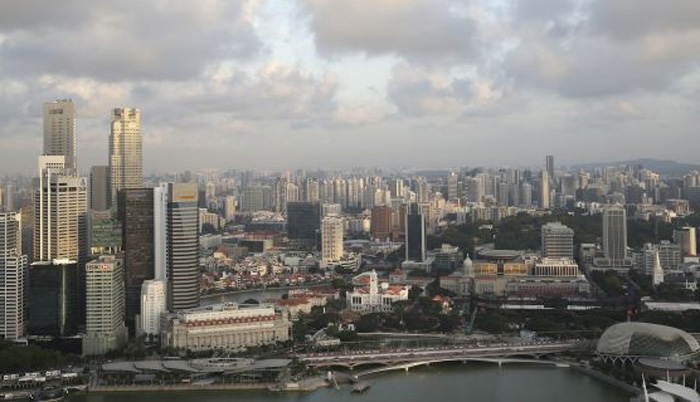![]() Home > Singapore
Home > Singapore
Singapore's hidden home-sharing economy is quietly on the rise

TODAY file photo
![]() October 12th, 2017 | 11:01 AM |
October 12th, 2017 | 11:01 AM | ![]() 2383 views
2383 views
SINGAPORE
Sizing up the home-sharing industry in Singapore has become the economist's puzzle as the aspiring "Smart Nation" grapples with resistance to next-door strangers.
Despite government rules restricting the likes of Airbnb Inc operating in Singapore, there are signs that home-sharing has become more prolific in the city-state. Residents' complaints about short-term rentals for private homes have climbed this year, while a surge in tourist arrivals isn't being mirrored in hotel receipts, indicating more visitors may be staying in private homes.
It highlights the challenge Singapore's government is facing in trying to adapt residents to a changing global economy. Authorities are seeking to build Singapore into a digital economy, but has to balance those imperatives without alienating citizens who say they're distressed about strangers sweeping through their neighbourhoods.
The Urban Redevelopment Authority in June instituted a three-month minimum for such private rentals — directly at odds with the routine of the typical user of Airbnb. The home-sharing service currently lists more than 300 rentals in Singapore and typically offers one- or two- night minimum stays that would violate the rules.
In the first seven months of the year, 415 cases of short-term rentals were reported to the government, Minister for National Development Lawrence Wong said in August. At that pace, 2017 is on track to hit 711 cases, exceeding last year's 608 and 377 in 2015.
A public consultation process on short-term stays that began in 2015, as well as separate talks with industry players, like Airbnb and hotel operators, didn't result in a clear consensus, URA said in an emailed response to questions. Among the issues that needed to be addressed were privacy, taxation and safety of occupants. Another public consultation process will be conducted soon, it said.
"The issue on short-term stays is complex, multi-faceted and has wide-ranging implications," the agency said. "While there is a place for short-term rental platforms in Singapore, what the government intends to do is carefully review and consider safeguards in place to ensure that such rentals do not negatively affect the amenity of residential estates."
Market Size
Airbnb said its travellers to Singapore typically stay 4.1 nights compared with 3.6 for the average tourist, and three-quarters of listings are outside of traditional hotel districts, allowing tourism spending to accrue in areas that don't usually host outside visitors.
"We're encouraged that the Singapore government is conducting a public consultation on this issue and we look forward to participating and making sure the voices of our community are heard," said Mich Goh, Airbnb's head of public policy for Southeast Asia.
Chua Hak Bin, a Singapore-based senior economist with Maybank Kim Eng Research, studied a basket of tourism data that help collectively illustrate the size of the home-sharing market in the absence of comprehensive, public figures on the companies' operations.
Seeing hotel receipts in a funk, international visitors on the rise and hotel rates relatively stagnant, Mr Chua concludes that the informal short-term rentals must be gaining.
"Home-sharing may attract a new segment of visitors who would have otherwise not come to Singapore," Mr Chua said. While the contribution to the national economy probably will remain modest, potential for the business is "quite large" and could benefit local neighbourhoods that don't typically cater to tourists, he said.
The tourism data could also be masking those visitors transiting through Singapore without staying, a possible reason why hotel rates are depressed despite a pickup in travellers. Nomura Holdings Inc's Brian Tan points to a recent surge in Indian tourists, who have frequently headed straight to cruise ships upon arrival in Singapore rather than booking overnight stays.
The future for home-sharing in Singapore remains a bit murky, as lawmakers debate how stringently to rein in renting and how to ensure the changes in standards are well understood.
In a February debate in Parliament, Louis Ng Kok Kwang, a lawmaker for the ruling People's Action Party, urged the government to regulate rather than ban home-sharing services, noting that the approach so far is inconsistent with how Singapore treated car-sharing businesses, such as Uber Technologies Inc and Grab.
Singaporean startup Roomorama, another home-sharing company, closed up shop this year, citing "increasing competition and regulatory headwinds" in a statement on its website. HomeAway retains Singapore listings for short-term rental, with minimum stays frequently below the three-month minimum mandate.
"Probably it's a bit of give-and-take" for the government in regulating the industry, said Selena Ling, head of treasury research and strategy at Oversea-Chinese Banking Corp. in Singapore. Among the issues they're probably prioritising is how best to tax the home-sharing businesses, which don't neatly fit into traditional categories of homes or investment properties, she said.
"If there's a very big push from the ground, they'll look at enforcing it a little bit more strictly," said Ling. Because the government recognises the industry is still in early phases, though, "you could take more of a laissez-faire approach. You consult, you do a little trial-and-error, rather than say no outright." BLOOMBERG
Source:
courtesy of TODAY
by Today
If you have any stories or news that you would like to share with the global online community, please feel free to share it with us by contacting us directly at [email protected]